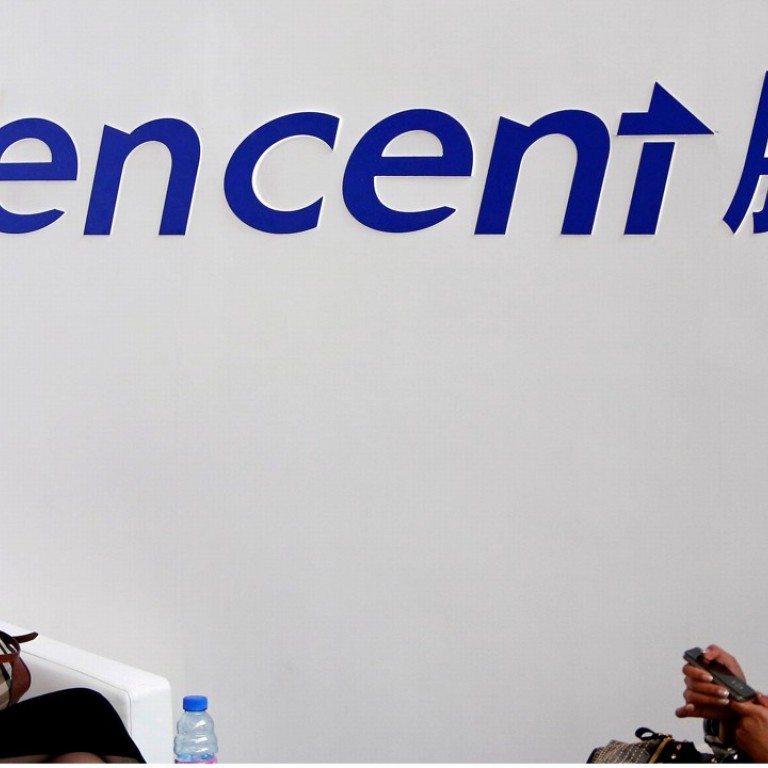
Tencent posts first profit decline since 2005 on lower gaming revenue, investment gains
Tencent surpassed US$500 billion in market value last year, becoming the first Asian company to achieve the distinction. But its shares have declined from a January record on concerns about a slowing gaming business
Tencent Holdings, which has lost more than US$150 billion in market value since January, reported a 2 per cent drop in second-quarter profit on lower gaming revenue and investment-related gains.
Net income fell to 17.9 billion yuan (US$2.6 billion) in the quarter ended June 30, compared with 19.3 billion yuan average of 12 analyst estimates compiled by Bloomberg. Sales were 73.7 billion yuan, missing analyst estimates.
Tencent’s mobile-game business reported a decline of 19 per cent to 17.6 billion yuan from the prior quarter, as it failed to get approval to charge fees for popular tactical tournament games and new game releases were delayed.
Its shares were down 3.6 per cent at HK$324 in Hong Kong trading as of 09:50am.
“In the third quarter, we expect gaming revenue growth to stay positive year-on-year due to increased monetisation of existing popular games,” said equity analyst He Saiyu in a co-written report from Huatai Financial Holdings. “Mini programs should help to boost Tencent’s cloud, advertising and online payments business growth … User traffic and engagement levels across all the major platforms [including WeChat and QQ] within Tencent are all growing at a healthy pace.”
The Shenzhen-based company surpassed US$500 billion in market value last year, becoming the first Asian company to achieve the distinction. But while US technology giant Apple has gone on to top US$1 trillion in value, the Hong Kong-listed operator of the WeChat social network has seen investors dump its stock amid broader market concerns about a trade war between the US and China, and speculation that internet companies have reached a peak in social media use.
A crackdown by the Chinese government on online content has also spilled over to gaming, with the industry accused of fostering addiction.
Shares of Tencent have declined 17 per cent this year in Hong Kong, almost double the 8.7 per cent decline in the benchmark Hang Seng Index. The stock traded at HK$336 as of Wednesday’s close. Naspers, Tencent’s largest shareholder, fell as much as 7.6 per cent in Johannesburg trading after the earnings were announced.
The company expects measures to “reinvigorate” its mobile game revenue growth to take “several months to take effect”, according to its filing. Those steps include “deepening engagement” with its existing major titles and “monetising” popular tactical tournament games.
The gaming giant was dealt a setback this week after the blockbuster title Monster Hunter: World was pulled on Monday from its WeGame platform, less than a week after its launch.
The abrupt removal of the Capcom title comes amid a months-long hiatus in government approvals for upcoming titles. The State Administration of Radio and Television, in charge of monitoring games and other entertainment content, has not issued licenses to any new games since March 28, which contributed to a slowdown in China’s gaming market.
Regulators have yet to approve the introduction of in-game purchases that Tencent needs to generate revenue from. Tencent needs new hit titles to sustain the growth set by its flagship game Honour of Kings.
Tencent has added controls to how much young people can spend on its games and limited play time for those under 12, after People’s Daily last year compared Honour of Kings to “poison”.
Advertising revenue rose 39 per cent to 14.1 billion yuan in the second quarter, driven by ads on its WeChat Moments, a feature similar to Facebook’s Timeline. WeChat had 1.06 billion monthly active users as of the second quarter, according to the company.
On its payments business, Tencent said it expected revenue and gross margins to be negatively affected by the People’s Bank of China’s decision to increase centralised deposit ratio, which reduces interest income. With that ratio reportedly set to increase to 100 per cent from 52 per cent as of July, Tencent pledged to seek alternative ways to monetise its payment business.
With 800 million monthly active users by the end of June, Tencent’s payment service has recorded a 40 per cent increase in average daily transaction volume compared to the year earlier, with commercial payments – settlements made to merchants – accounting for more than half of the total volume for the first time.


